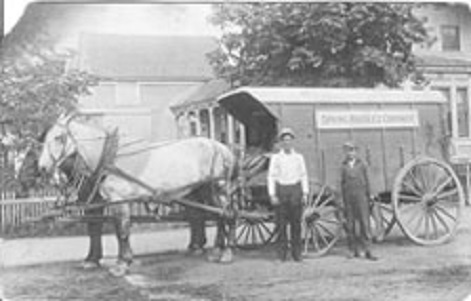Remembering ice houses
 by Roland D. Hallee
by Roland D. Hallee
As a young lad growing up in the early 1950s, I can still remember my parents having an ice box* in the kitchen of our home in Waterville. That predated us getting a “new fangled” electric refrigerator later in that decade.
In the box, ice was placed in the top compartment, and a small door was closed. As the ice melted, it drained down a tube that passed through the cold section, and into a large tray that was located in a compartment at the bottom of the “fridge.” Once the tray was full, it was emptied.
I can still remember the ice wagon approaching the house every week, on a still unpaved street in the middle of the city, carrying ice chunks. A man would get out of the buggy, take the order, cut the block of ice to size in the wagon, and lugged it in the house with a set of ice tongs. The ice came from the only ice house I can remember in Waterville, called Spring Brook Ice and Fuel Co., that was, at the time, located behind some warehouses on the corner of Pleasant and North streets (across from Ware-Butler Building Supplies). You could drive by there in the middle of summer and see the ice chunks covered with sawdust and straw to slow the melting process. The company still exists today, only no longer offers ice. Those ice houses remained long after the industry disappeared, and were eventually torn down sometime around the 1980s.
The Spring Brook Ice Company was taken from the name of the crystal clear brook on Drummond Avenue that the owner, Robert L. Ervin, dammed and harvested every winter with his men. Blocks of ice were cut with heavily-toothed saws and carried by conveyor belt into the massive icehouse to be covered with straw and sawdust. Ervin was a Colby College graduate, coach, and business owner. He did not have to look far to see the sound commercial potential in the Kennebec River which had become the source of “frozen gold” for entrepreneurs shipping ice all over the world.
*My father preserved that icebox and installed it in a rec room in the basement of the house. It remained there until it was partially damaged by fire on December 1, 2018. The door was destroyed but the remainder of the shell and shelves remain.
Responsible journalism is hard work!
It is also expensive!
If you enjoy reading The Town Line and the good news we bring you each week, would you consider a donation to help us continue the work we’re doing?
The Town Line is a 501(c)(3) nonprofit private foundation, and all donations are tax deductible under the Internal Revenue Service code.
To help, please visit our online donation page or mail a check payable to The Town Line, PO Box 89, South China, ME 04358. Your contribution is appreciated!



Leave a Reply
Want to join the discussion?Feel free to contribute!